
Erin Flaherty ‘28
I am a 14 year old cashier for a grocery store, and I work at least 20 hours a week. I don’t mind the extra money, but I don’t get enough break time. I know that I am being overworked. I’m too scared to speak up, though, because I am unaware of most of the labor laws for my age. I feel uneducated and that it is inappropriate for me to speak up against my boss.
This anecdote highlights the reality of many teenagers who are too scared to speak up against being overworked. Teenagers face many challenges in the workplace, such as feeling pressured or asked to put in extra hours, often by people of authority. Teens may be unintentionally overworked as well, likely due to a lack of knowledge regarding their rights. This ultimately leads to the employer taking advantage of the worker, scheduling them far past the time they are legally allowed to work.
In order to find out the extent of this problem, we conducted a study regarding work experience among teens here at CCHS. After sending a school-wide poll inquiring about work conditions, our data has found a trend regarding bosses failing to review their employees’ rights and/or labor laws during the hiring process. Many students’ experiences echo this fourteen year-old worker and freshman at CCHS who stated, “When I was hired, my boss never told me the maximum hours I could work, or any other labor laws, yet I was still hired.”
When we asked what 13-15 year-old workers at CCHS knew regarding their legal working hours, about 36% had not received any information, 43% were unsure, and only 21% were informed about the maximum hours they could work.
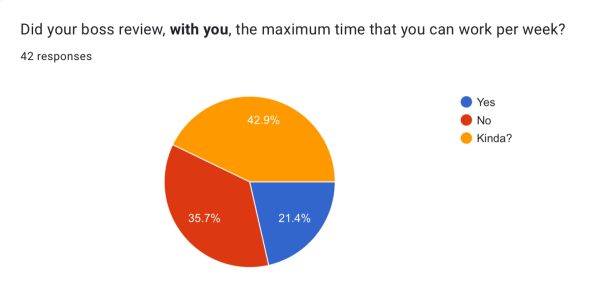
Similarly, among 16-17 year-olds, 32% received no information and 34% were unsure, while only 34% were informed about the maximum hours they are legally allowed to work.
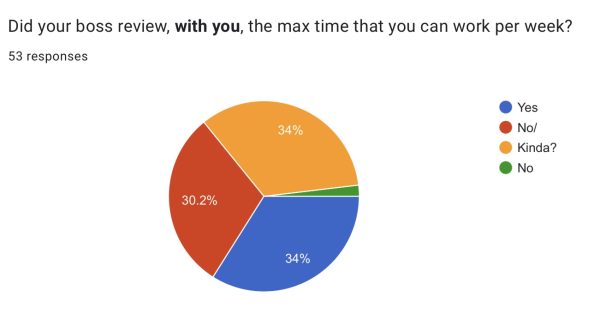
These teenagers’ bosses had failed to mention employee rights and labor restrictions. Massachusetts labor laws require all employers to “post a wage and hour law notice at the workplace in a location where it can easily be read.” Additionally, if the employee inquires about their rights, the employer must review the documents with them. Similarly, New Hampshire labor laws state that employers “are required to post labor laws in a conspicuous place in every room where youths are employed.” This law requires a printed notice stating the hours of work, time allowed for meal breaks, and maximum number of hours permitted to work in a day. Though both states require a visible, printed notice, ultimately, the responsibility to ensure that teen workers understand their rights falls on the employee.
After analyzing our data, we interviewed one worker from each grade level who experienced some form of mistreatment at work, and there are many similarities among their stories.
A freshman worker at CCHS, employed at a gymnastics studio, is frequently asked to work past her legal limit. She works two and a half hours on Thursdays and Fridays which is legal; however, she works past 7:30pm on Fridays. It is illegal for her age group to work beyond 7:00pm on weekdays, including Friday. She informed us that she was asked to work these hours by her boss, stating, “I work those hours (past 7:00pm) for a class I teach.” Although she allows herself to work these hours, her boss is aware that she is breaking the law. Nevertheless, there is no remediation for this worker.
One sophomore at Central is in a very similar situation. He has reported taking extra hours, shifts, and putting in requests to work overtime. The student informed us that his boss told him that he is “not supposed to [work extra hours], but [they are] allowing it.” Upon being interviewed, this teenage employee did not know his hours were illegal. He started picking up extra hours in preparation for his upcoming sixteenth birthday. Even though his working hours are subject to change upon his birthday, his employer still allowed him to work illegally as a fifteen year-old with restricted hours.
A junior at CCHS often works over nine hours per day on weekends, and until closing on weekdays; both conditions are illegal for her age. She has stated that her workplace is “often understaffed, missing team members, and the manager lacks knowledge on scheduling workers.” The student was unaware of her hours being illegal, but stated that her “manager knows [scheduling those hours] is illegal, but still has [her] work past nine hours.”
All of these students have employers who are aware of their maximum hours, yet do nothing to abide by the law.
Many other working students at CCHS have been asked to work past their legal limits. Overall, close to 25% of 13-15 year olds have been asked to work illegal hours. Although this percentage seems small, it is astounding that any minors are asked to work past the hours they are allowed to work by law.
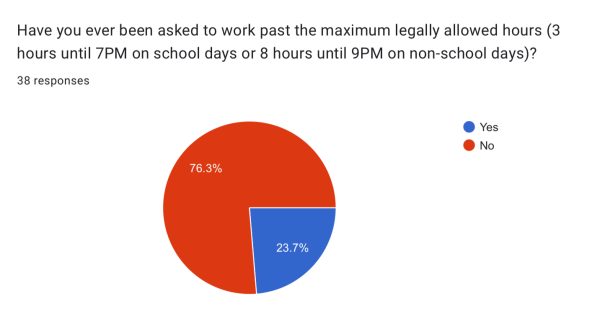
Similarly, among 16-17 year olds, almost 20% of workers are asked to work illegally.
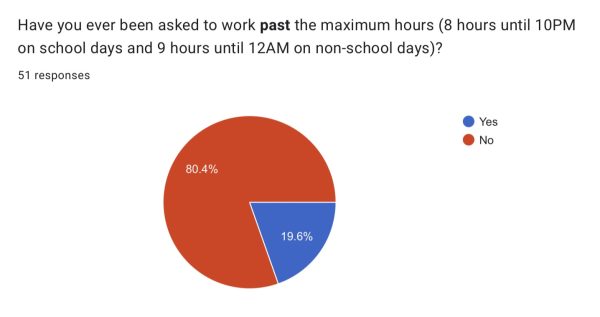
These data show that 21% of working students who responded to our poll are, or were, asked to work illegally.
We also included a section in our poll to gather information from 18 year-olds, who no longer have restrictions on work hours, but may have experienced mistreatment in the past.A senior at CCHS, who has held many jobs, reported being overworked as a minor. He mentioned understaffed shifts and scheduling to deliberately prevent breaks.
This information led us to analyze the commonality of general mistreatment in the work environment. Among 13-15 year-old employees, 24% reported feeling overworked, underpaid, and/or mistreated at work.
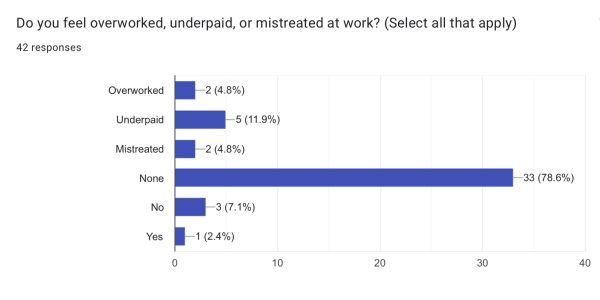
About 51% of 16-17 year-olds reported experiencing mistreatment treatment in general at work.
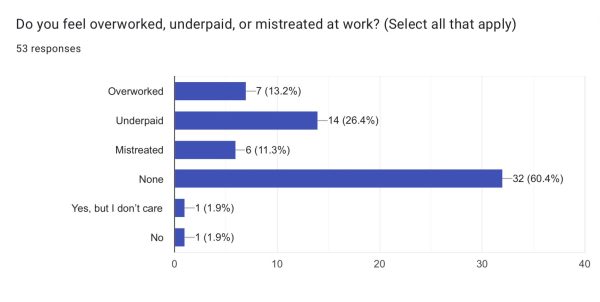
Around 38% of all working minors at CCHS, who responded to the poll, were subject to negative working conditions.
In conclusion, 55 out of the 184 participants involved in this study either worked over their legal limits, were underpaid, mistreated, or experienced some version of all of these conditions combined. Since there appears to be little consequence if employers fail to inform their employees about their rights, this appears to be an ignored responsibility. Consequently, overworked teens are often overlooked and think nothing of putting in a few extra hours, when, in reality, the states of Massachusetts and New Hampshire have determined that there are legal limits for teenage workers.
Teenage employees need to advocate for themselves. Speak up, explain the law to your boss or report your employers of mistreatment or exploitation. You have rights as teenagers that should be, but are often not, protected by your own state’s laws.